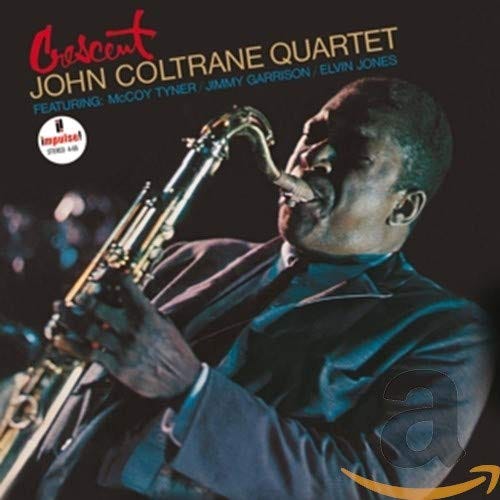John Coltrane Quarter — Crescent
10.September.2020
John Coltrane Quartet
Crescent
1964
I’ve always been interested in the work of artists just before or after their seminal work. Keeping that in mind, Crescent is the album before his watershed album, A Love Supreme.
The album was released in 1964 on Impulse! Records and captures Coltrane’s continued exploration of drum/saxophone duets.
This record, recorded between April and June of 1964, and released in July, the John Coltrane Quartet features:
John Coltrane — tenor sax
McCoy Tyner — piano
Jimmy Garrison — double bass
Elvin Jones — drums
The importance and legacy of John Coltrane can’t be understated.
He may have begun his career in bebop and would work with both Miles Davis and Thelonious Monk; his legacy would be as one of the leaders of “free jazz.”
“Free jazz” (aka avant-garde jazz, modern jazz, free improvisation) saw musicians mess around with jazz conventions like tempos, tones, and chord changes. Artists who explored this felt the confines of things like bebop were too restrictive. Artists like Coltrane, Ornette Coleman, and Albert Ayler became increasingly preoccupied with creating something new.
[Fun Fact #1: John Coltrane received a Pulitzer Prize for his “his masterful improvisation, supreme musicianship and iconic centrality to the history of jazz” …40 years after his death, in 2007]
You can hear the elements of “free jazz” throughout Crescent. On the second track, “Wise One,” you can listen to this improvisation from Coltrane in full effect.
Coltrane’s canvas is large enough to incorporate his other players.
At just over three minutes, the third track, “Bessie’s Blues,” is a tight pop-sounding jam that gives pianist McCoy Tyner some breathing room. And then leading into an almost call and response with Coltrane. Unless I’m mistaken, you can even hear a few bum notes from the genius, which adds a layer of authenticity paramount to “free jazz.”
The two tracks that make up the second side of Crescent, “Lonnie Lament” and “The Drum Thing” see Coltrane not taking a solo.
What is significant about “Lonnie’s Lament” is that its chord progression “allows for more interesting improvisation” from bass player Jimmy Garrison. A fan favorite, an earlier version of “Lonnie’s Lament,” appears on Afro-Blue Impressions, but it is this version Coltrane would return to. Having the room to expand allowed Coltrane’s last incarnation of the quartet to record an hour-long version on his album Live in Japan.
Giving each player their space, “The Drum Thing” is left for drummer Elvin Jones. Coltrane’s sax and Garrison’s bass only pop up at the beginning and the end of this seven-minute track.
[Fun Fact #2: Toto guitarist Steve Lukather is the soloist on “Crescent” from the 2005 tribute album A Guitar Supreme.]
CRITICS:
Michael G. Nastos at AllMusic wrote: “…no better example of this quality transferred to musical endeavor is available than on this definitive, must-have album that encompasses all that he was and eventually would become.”
Tony Scherman at EW said: “…one convention after another — chord progressions, unvarying tempos, traditional soloist/accompanist relationships — was tossed overboard. Paradoxically, as the quartet’s music grew more challenging, it grew more seductive, more darkly inviting.”
Crescent is a brilliant look at what would come next for John Coltrane. It is, at times, meditative, dark, and a bit boppy. It is a clear indication of where he was headed.
The influence of John Coltrane’s work continues to impact artists today. And not only in jazz, but you can also hear his stamp on rock and even some heavy metal.
John Coltrane died of liver cancer in 1967. In fitting style, his funeral service at St. Peter’s Lutheran Church in New York City was started by the Albert Ayler Quartet and finished by the Ornette Coleman Quartet.
[Fun Fact #3: After John Coltrane died in 1967, a congregation in San Francisco began worshiping him as a god, and the congregation became affiliated with the African Orthodox Church; this involved changing Coltrane’s status from a god to a saint. The St. John Coltrane African Orthodox Church is the only African Orthodox church that incorporates Coltrane’s music and his lyrics as prayers in its liturgy …who says Eric Clapton is God?]
AOTD - Albums of the Day
For the week of September 7, 2020keithrhiggons.substack.com




